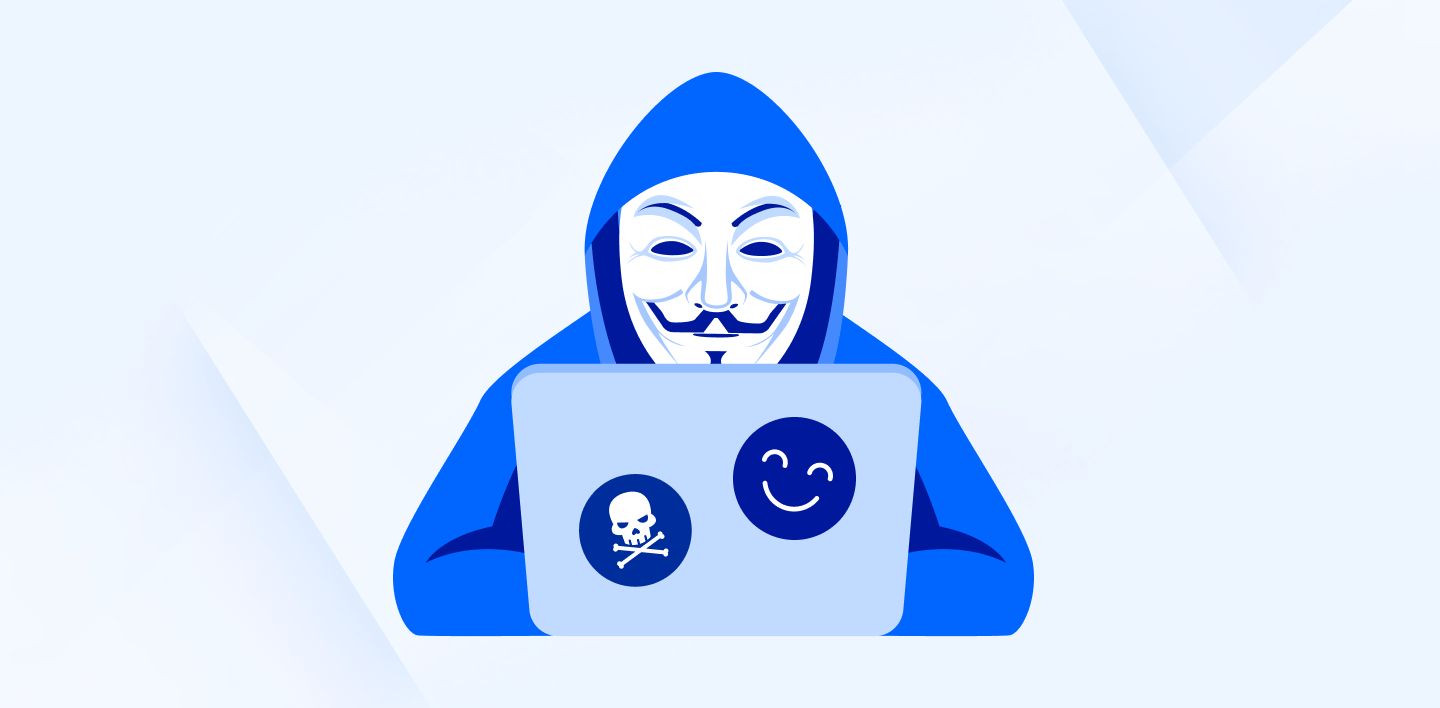Different Types of Hackers: The Good, the Bad, and the Other

Hacking and hackers are terms that have become increasingly prevalent in our modern world. They are also often associated with negative connotations. By definition, hacking is using computer programming and technical skills to gain unauthorized access to computer systems, networks, or digital devices. Meanwhile, a hacker is someone who engages in these activities.
However, it is important to note that not all hackers are criminals. Some use their technical expertise for positive purposes, such as identifying and fixing security vulnerabilities in computer systems. On the other hand, there are also those who use their skills for malicious purposes. These activities include stealing sensitive information, spreading viruses or malware, or carrying out cyber attacks on organizations or individuals.
This article will discuss the different types of hackers and how they work. We will also discuss examples of these types of hackers and their roles in the industry.
The Different Types of Hackers
Hackers can be classified into three categories: the good or the white hat hackers, the bad or the black hat hackers, and the "others," often referred to as gray hat hackers.
The Good Hackers, aka White Hat Hackers
White hat hackers are the type of hackers that use their technical expertise to find vulnerabilities and weaknesses in computer systems and networks to improve security. They work to identify potential security threats to help organizations strengthen their defenses and protect against malicious attacks.
White hat hackers are sometimes called ethical hackers because they use their skills to help others and make the digital world safer. They often work as security consultants or penetration testers, and companies or organizations may employ them to test their systems and networks for vulnerabilities.
This is especially important when considering the rise of cloud computing amongst modern businesses, and the resulting increase in reports of serious cyber attacks.
While white hat hacking is generally considered legal and ethical, these professionals must follow specific guidelines and obtain permission before testing or attempting to hack into any system. Adherence to these rules helps ensure they act within the bounds of the law and that their actions are not causing harm to others.
Good hackers typically fall into the following categories based on their specific expertise:
Security Testers: These are hackers hired by organizations to test the security of their systems and networks. They attempt to exploit vulnerabilities and weaknesses to identify security gaps and make recommendations for improvement.
Vulnerability Researchers: These hackers focus on discovering and reporting software, systems, and network security vulnerabilities to the vendors or organizations responsible for those products. They aim to help improve security by providing information about these vulnerabilities so security experts can fix them.
Bug Bounty Hunters: These hackers are motivated by financial incentives to find and report security vulnerabilities. They work independently or as part of a bug bounty program that offers rewards for finding and reporting bugs.
Security Consultants: These hackers work with organizations to develop and implement security strategies and policies to protect against cyber threats. They advise on security best practices, risk assessments, and incident response planning.
Cryptographers: These hackers work on developing and testing encryption algorithms and other cryptographic techniques to protect data and communications from unauthorized access. They help to ensure the integrity and confidentiality of data and verify the authenticity of communications.
Reverse Engineers: These hackers specialize in reverse engineering, which involves decompiling and analyzing software or hardware to identify security vulnerabilities or improve performance. They may work for security companies, government agencies, or other organizations to develop new security tools and techniques.
Good hackers are considered an essential part of our society's cybersecurity efforts. After all, they use their technical skills and knowledge to provide businesses with more secure network systems. Here are several reasons why good hackers are significant in every industry:
- Protecting the public: Ethical hackers help to safeguard the public by identifying and reporting vulnerabilities that malicious hackers can exploit. That protects individuals and organizations from potentially devastating cyber attacks.
- Improving cybersecurity: By identifying and reporting vulnerabilities, ethical hackers help to improve cybersecurity for all of us. This results in more secure and reliable computer systems, networks, and software applications.
- Advancing technology: Good hackers help to advance technology by finding new and innovative ways to secure computer systems and networks. This encourages the development of more secure technology and promotes innovation in the industry. Businesses looking to save money on tech through innovation also benefit from good hackers.
- Preventing financial loss: Cyber attacks can result in significant financial losses for individuals and organizations. Ethical hackers help mitigate the financial impact of cyber attacks by identifying vulnerabilities and preventing attacks.
- Promoting transparency: Ethical hacking promotes transparency and accountability in the technology industry. By identifying vulnerabilities and reporting them, ethical hackers hold software companies and technology providers accountable for their security practices.

The Bad Hackers, aka Black Hat Hackers
Black hat hackers use their technical expertise to gain unauthorized access to computer systems and networks for personal gain or to cause harm. They use their skills to exploit vulnerabilities and weaknesses in systems, and they may steal data, money, or other valuable information or use their access to cause damage or disruption.
Unlike white hat hackers, black hat hackers operate with malicious intent and may engage in illegal activities such as stealing data, installing malware, or taking over systems for their purposes. They may also sell stolen information on the dark web or use it to commit identity theft or cybercrime.
Because of their illegal and unethical actions, black hat hackers are pursued by law enforcement agencies and could face serious consequences if caught. Individuals and organizations must protect themselves against black hat hackers by implementing strong security measures, keeping their systems updated, and avoiding risky online behaviors.
Bad hackers typically fall into the following categories based on their specific actions and motivations:
Cybercriminals: These hackers use their skills to carry out illegal activities, such as stealing personal information and confidential business data, financial fraud, or carrying out attacks for financial gain.
Hacktivists: These hackers use their skills to carry out attacks to promote political or social causes. They may deface websites, leak sensitive information, or disrupt services to achieve their goals.
Nation-State Hackers: These hackers are employed by governments to carry out cyber espionage, cyber sabotage, or other attacks to further their country's political or economic interests. They may target other countries' governments, critical infrastructure, or corporations.
Script Kiddies: These are inexperienced hackers who use pre-made hacking tools and scripts to carry out attacks. They may not have specific goals and may engage in attacks just for fun or to prove their skills.
Insiders: These are individuals with authorized access to systems and data who use their access for unauthorized purposes. They may steal sensitive information or disrupt systems and operations.
Scammers: These hackers use phishing or other social engineering protocols to deceive people into sharing sensitive information like credit card numbers or passwords, or downloading malware onto their computers.
Ransomware Attackers: Using malware, these hackers encrypt files on a victim's network or personal computer and demand payment for the decryption key. They may also threaten to release sensitive information if the ransom is not paid.
Bad hackers pose a significant danger to individuals, organizations, and society. Here are some of the dangers posed by bad hackers:
- Theft of sensitive information: Bad hackers can steal sensitive information such as credit card numbers, personal identity information, and business records. This information can be used for identity theft, financial fraud, or corporate espionage.
- Disruption of essential services: Bad hackers can disrupt essential services such as power grids, transportation systems, and emergency services. That can result in chaos and panic, and even loss of life.
- Damage to computer systems: Bad hackers can damage computer systems by introducing viruses, malware, or other types of malicious code that can cause data loss, system crashes, and other technical problems.
- Ransomware attacks: Bad hackers can use ransomware to encrypt files on a victim's computer or network and demand payment in exchange for the decryption key. It can result in significant financial losses for individuals and organizations.
- Cyberbullying and harassment: Bad hackers can use social media and other online platforms to harass, bully, or intimidate individuals. This can cause significant emotional distress and harm.
- Spread of misinformation: Bad hackers can use social media and other online platforms to spread misinformation, propaganda, and fake news. This can cause confusion, political instability, and even violence.
The Others, aka Grey Hat Hackers
Gray hat hackers use their technical expertise to find vulnerabilities in computer systems and networks. Similar to white hat hackers, they may not always act ethically or legally.
Unlike black hat hackers, gray hat hackers do not have malicious intent, and their actions are usually not intended to cause harm. However, they may not always obtain explicit permission to test or attempt to hack into systems, and their activities may sometimes be illegal or unethical.
Gray hat hackers may use their skills to uncover vulnerabilities or weaknesses in systems and networks and then contact the owners or administrators of those systems to inform them of the issues. They may also sometimes attempt to exploit the vulnerabilities they discover to demonstrate the seriousness of the issue and encourage action to be taken.
While gray hat hacking can sometimes be a gray area in terms of ethics and legality, it's generally recommended that individuals obtain explicit permission before attempting to test or hack into any systems to ensure that their actions are legal and ethical and not are causing harm to others.
Security Researchers: These individuals discover vulnerabilities in software or systems but may not always follow responsible disclosure practices. They may use the information to expose the vulnerabilities publicly or sell it to other parties for profit.
Hackers for Hire: These individuals use their hacking skills to offer services for a fee. They may be hired to test the security of a company's systems or help individuals access locked devices or accounts.
Vigilante Hackers: These individuals use their hacking skills to take matters into their own hands, and attack organizations or individuals they believe are doing something wrong. They may expose sensitive information or disrupt operations, making their actions illegal.
Gray Hat Hacktivists: While hacktivists are typically considered black hat hackers, some may consider themselves gray hat hackers. They may use their hacking skills to carry out attacks to promote political or social causes but may not engage in malicious activities.
Leakers: These individuals gain unauthorized access to sensitive information and leak it to the public. They may do this to expose wrongdoing, or for personal gain or fame.
Cracker Defenders: These individuals use their hacking skills to take down or disrupt the activities of black hat hackers, such as by taking control of their systems or stealing their data. While they may be helping to defend against malicious activities, their activities may be illegal.
Identifying gray hat hackers can be challenging as their motivations and intentions can be ambiguous or unclear. However, some characteristics may help in identifying them:
- Unusual or suspicious behavior: Grey hat hackers may engage in behavior that is not typical of regular users, such as probing or scanning computer systems, networks, or websites for vulnerabilities, or attempting to gain unauthorized access to those systems.
- Disclosure of vulnerabilities: Grey hat hackers may contact the organization or individual whose system they have hacked and disclose any vulnerabilities that they have found. They may also advise fixing these vulnerabilities and improving security measures.
- Inconsistency in behavior: Grey hat hackers may engage in ethical and unethical behavior, making it difficult to classify their actions as black or white.
- Communication style: Grey hat hackers may communicate with the organization or individual they have hacked and provide information about the vulnerabilities they have found. They may use language that suggests a desire to help or expose vulnerabilities, but they may also demand payment or other incentives.
- Motivations: Grey hat hackers may have various motivations for their actions, such as a desire to improve security, gain recognition, or make money. Understanding their motivations can help in identifying their intentions and assessing the potential harm they may cause.
It is important to note that hacking without authorization is illegal, and even if a hacker has good intentions, one may still be held accountable for their actions. It is always best to work within legal and ethical boundaries when dealing with cybersecurity and to seek professional help from security experts if you suspect that your systems have been hacked.

All Types of Hackers Can be Prevented With Proper Security Measures
Hacking and hackers have become a significant concern for governments, businesses, and individuals around the world due to the potential risks they pose to data security and privacy. Therefore, all of us need to be aware of the dangers of hacking and take appropriate measures to protect our personal and professional information from cyber threats.
Knowledge of the various kinds of hackers and their motivations can help individuals and organizations better protect themselves against potential cyber threats and attacks. By implementing the best security software solutions and staying informed about the latest threats and vulnerabilities, we can help ensure that our digital world remains safe and secure for everyone.

